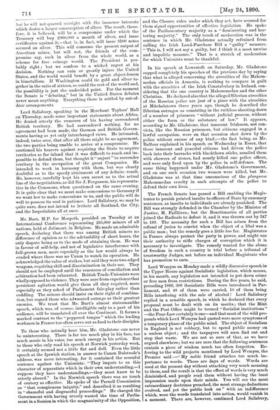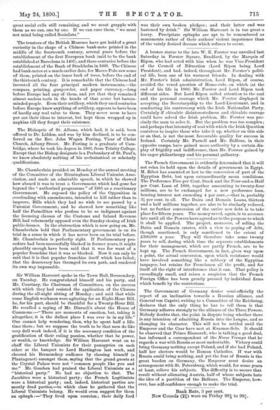Lord Wemyss on Monday made a wildly discursive speech in
the Upper House against Socialistic legislation, which means, in his mouth, any legislation not intended to put down crime or free men from restrictions. During the five years, he said, preceding 1889, 308 Socialistic Bills were introduced in Par- liament, and 40 of them were carried, 10 of them being Bills interfering with the sale of alcohol ! Lord Salisbury replied in a sensible speech, in which he declared that every proposal must be dealt with on its merits ; that the Mint and the Post Office might be termed "Socialist institutions" —the Poor-Law certainly is one—and that most of the wild pro- posals which Lord Wemyss had quoted were mere symptoms of a temporary phase of the public mind. The object of Socialism in England is not robbery, but to spend public money on a useless object; and the taxpayers will soon find out and stop that waste. We are not so sure of that, as we have argued elsewhere; but we are sure that the following sentences contain a piece of wisdom much too often forgotten. Re- ferring to the wild projects mentioned by Lord Wemyss, the Premier said :—" My noble friend attaches too much im- portance to words. These are days of words. Words are used at the present day without attaching very much meaning to them, and the result is that the effect of words is very much diminished, and people read them without having the least impression made upon their minds. You will see the most extraordinary doctrines preached, the most strange deductions evolved, and yet the public look on" with an indifference which, were the words translated into action, would vanish in a moment. There are, however, continued Lord Salisbury,
great social evils stall remaining, and we must grapple with *hem as we can, one by one. If we can cure them, "we must not mind being called Socialists."



































 Previous page
Previous page